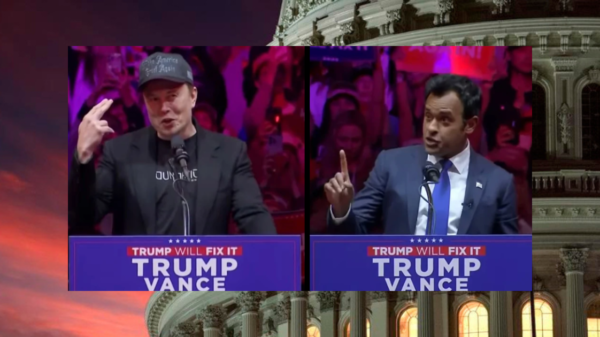When 9/11 mastermind Khalid Sheik Mohammed was captured on March 1, 2003, he tried to use the U.S. justice system as a shield.
“I’ll talk to you guys after I get to New York and see my lawyer,” he said, according to former CIA Director George Tenet.
But that ploy didn’t go according to plan. KSM was taken to a secret site, waterboarded and interrogated, and only got access to legal counsel several months later. Tenet swears that the information the CIA extracted from him thwarted other terrorist attacks and saved lives.
The Obama administration and many human rights activists counter that 9/11 terrorists’ torture and military commission trials undermine American ideals of equal justice under the law, violate the Geneva Conventions, and endanger U.S. soldiers captured overseas.
In the 22 years since 9/11, most Republicans running for president have sided with Tenet, jockeying for the strongest position in the war on terror, playing to their GOP base, which widely values strong counter-terrorism policies.
After President Obama swore to close the U.S. military prison at Guantanamo Bay, Cuba, 2016 candidate Donald Trump promised to fill it up again.
“We’re gonna load it up with some bad dudes,” he said. “Believe me, we’re gonna load it up.”
Trump also firmly rejected Obama’s failed attempt to try Guantanamo Bay detainees in civilian courts.
“I know that they want to try them in our regular court systems, and I don’t like that at all,” Trump told the Miami Herald when asked if Americans accused of terrorism should be tried in military commissions or in civilian courts.
In reality, fighting terrorism and punishing those accused of plotting terrorist acts isn’t always so clear-cut. As president, Trump signed an executive order in 2018 to keep the Guantanamo Bay prison camp open, reversing Obama’s 2009 order, which pledged to close it.
Yet, instead of re-filling the facility, Trump ended up helping to reduce the number of prisoners held there, repatriating one prisoner to Saudi Arabia in 2018.
While Trump chose to try Guantanamo Bay detainees in military tribunals, his administration sought justice for other terrorists in civilian courts. During a 2020 vice presidential debate, Mike Pence touted the Trump administration’s decision to try two ISIS guards responsible for the gruesome killings of four Americans in federal civilian court. The Trump administration had encountered challenges in extraditing the pair to the United States because of international concerns over the death penalty.
So far in the 2024 GOP presidential race, counter-terrorism policy has taken a backseat to other national security concerns, such as efforts to stop would-be terrorists from illegally crossing the southern border and differences over sending money and arms to Ukraine.
In the first debate in Milwaukee last month, Florida Gov. Ron DeSantis and longshot candidate Vivek Ramaswamy expressed their “America First” opposition to further military aid to Kyiv, drawing a stark dissent to the supportive views of the rest of the candidates on stage.
Meanwhile, Trump has boasted that the war in Ukraine would never have happened on his watch and that he would end it in 24 hours by telling Russia that if it doesn’t make a deal, “We’re going to give [Ukraine] a lot.”
Ramaswamy’s views on Guantanamo Bay and trying terrorists also cut against the prevailing GOP tough-on-terrorism grain.
“I was deeply skeptical that prisoners at Guantanamo Bay shouldn’t have been denied constitutional due process rights when that’s exactly what enshrines the justice system that we otherwise believe in,” he told his “The Vivek Show” podcast audience.
Such remarks echo the Obama administration’s approach. Obama’s Attorney General Eric Holder tried to move all alleged terrorist trials, including KSM, to civilian courts on U.S. soil. That plan failed amid a backlash from members of Congress and other local officials. Several times this year, Ramaswamy talked about his concerns over trying terrorists in military commissions as views he voiced back in college.
“I was one of the weird guys back in college and shortly after who was arguing vehemently for the rights, the constitutional due process rights of the people at Guantanamo Bay,” he told listeners in an April podcast.
Lingering questions over closing Guantanamo Bay and trying terrorists are not only relevant as the country commemorates the 22nd anniversary of 9/11 and pledges to “never forget” the terrorist attacks in New York and Washington that took the lives of more than 3,000 Americans.
As of May, 30 detainees remain at Guantanamo Bay. Just this week, Biden rejected requests for certain accommodations from lawyers for KSM and four others accused of conspiring in the Sept. 11, 2001, attacks in exchange for their guilty pleas.
Campaign spokespersons for Ramaswamy, Trump, Pence, DeSantis, Nikki Haley, and Tim Scott did not respond to questions from RCP on whether they would keep Guantanamo Bay open and how they would handle KSM’s trial and the plea negotiations as president. But the candidates’ past comments and positions on Guantanamo Bay offer strong clues.
During his time in Congress, DeSantis, a Navy JAG officer who deployed to Iraq as legal counsel to a SEAL commander, supported the use of military commissions to try Guantanamo Bay detainees.
While Obama was moving forward with a plan to send detainees to the U.S. for trial, DeSantis said he was worried about setting a precedent “when you have to convict them beyond a reasonable doubt.”
“Because guess what? That’s going to require our service members to have to go out in the middle of a hostile fire zone and collect evidence,” he told “Your World with Neil Cavuto” in 2015. “And that is not what we want them to do. It would actually cost American lives.”
During a 2016 Congressional hearing, DeSantis also recalled his visit to the detention facility at Guantanamo Bay and dismissed perceptions that Americans are treating the detainees unjustly.
“These guys should not be treated like they are committing civilian crimes. They should be treated as if they’re violating the laws of war,” he said.
Both Nikki Haley, while serving as South Carolina governor, and Tim Scott, the state’s senator, fought hard against an Obama administration plan to move the detainees held at Guantanamo Bay to a prison facility in their state or in Kansas.
Haley and then-Kansas Gov. Sam Brownback sent a letter to the Department of Defense, saying they would not tolerate “any illegal and ill-advised actions by the administration, especially when that action relates to importing terrorists into our states.”
In a 2016 post on Twitter, Scott described Obama’s plan to shut Guantanamo Bay and move the terrorists to domestic locations this way: “Illegal. Reckless. Unsafe. Need I go on?”
Susan Crabtree is RealClearPolitics’ White House/national political correspondent. This article was originally published by RealClearPolitics and made available via RealClearWire.
















